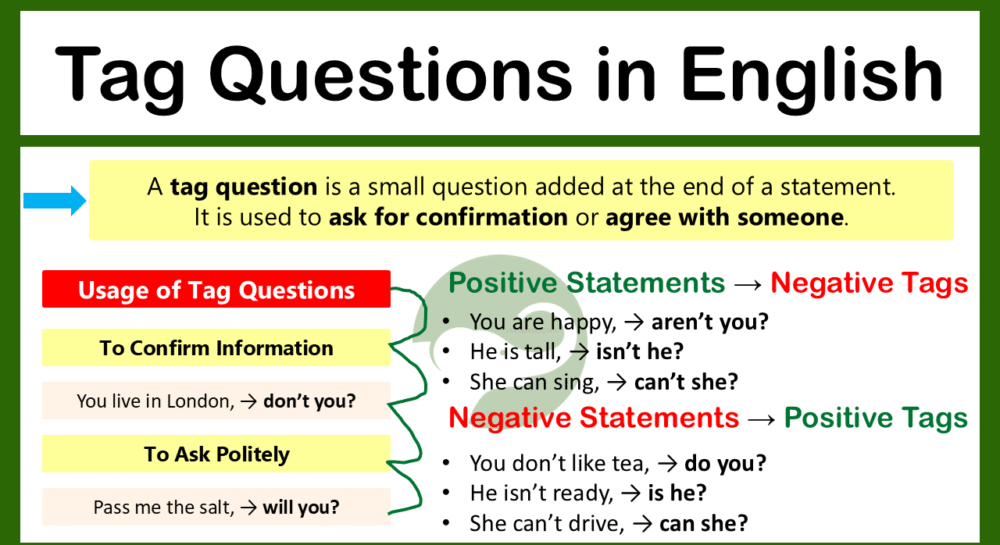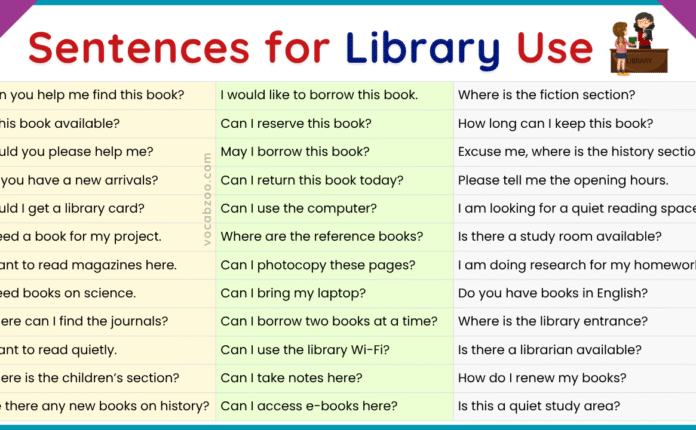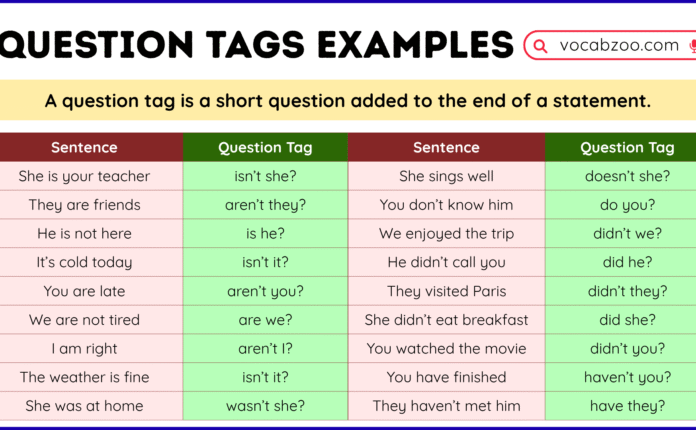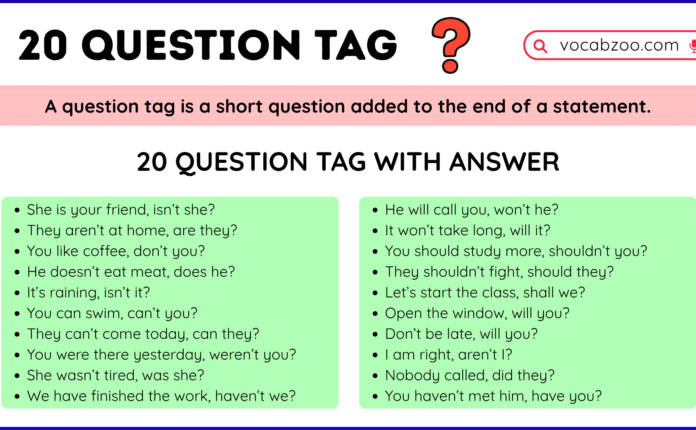Learning English tag questions can be fun and easy! Tag questions are short questions added at the end of a sentence to confirm information. They make your speech friendly and interactive. In this article, you will find 100 examples of tag questions with answers in a simple and fast way.
Tag Questions
A tag question is a small question added at the end of a statement. It is used to ask for confirmation or agree with someone.
Example:
- You are a teacher, aren’t you?
- She likes coffee, doesn’t she?
Structure:
- Positive statement → Negative tag
- Negative statement → Positive tag
Usage of Tag Questions
1. To Confirm Information:
- You live in London, → don’t you?
- He is coming today, → isn’t he?
2. To Show Surprise or Doubt:
- She won the match, → didn’t she?
- You don’t like pizza, → do you?
3. To Ask Politely:
- Pass me the salt, → will you?
- Close the window, → won’t you?
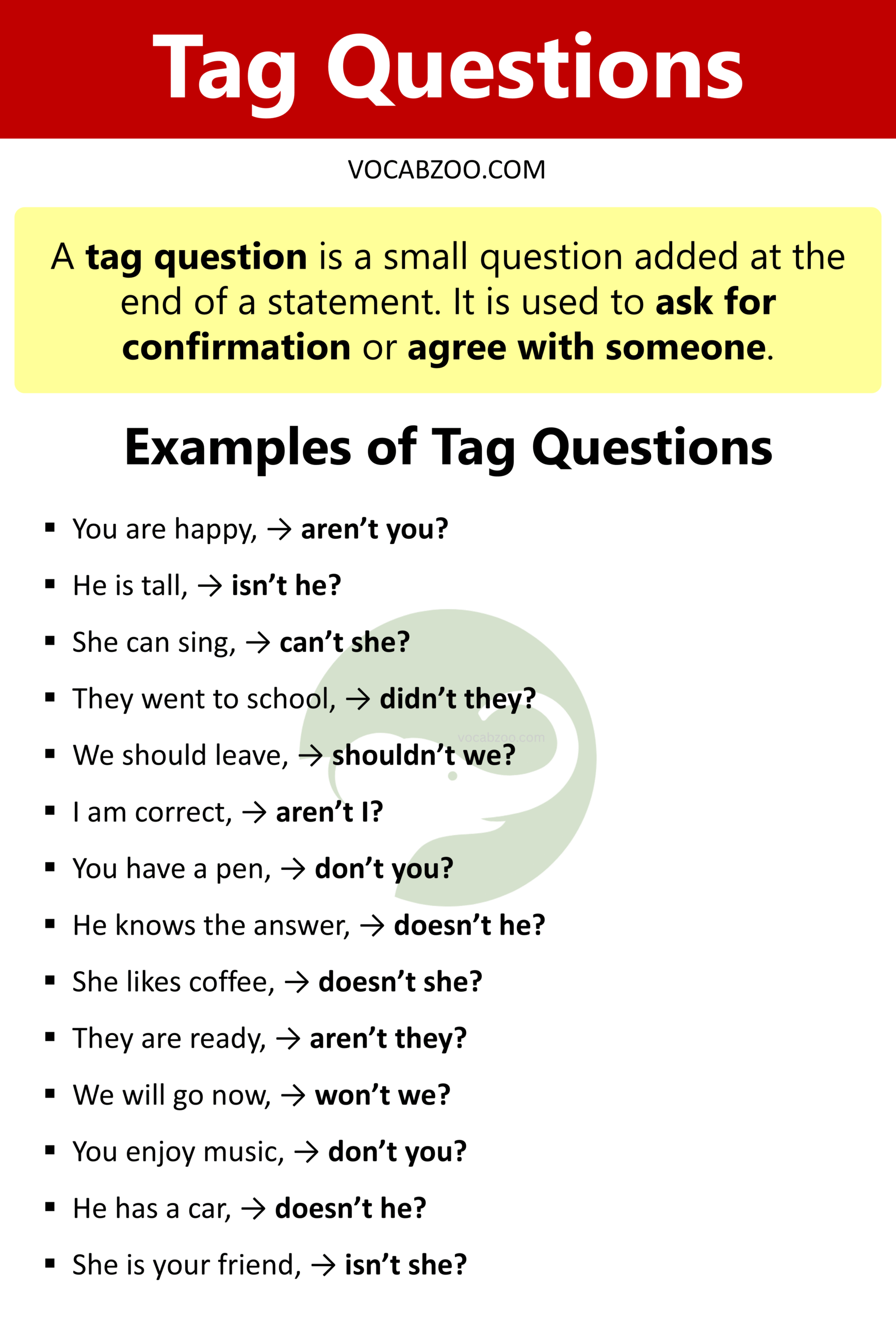
100 Examples of Tag Questions with Answers
Positive Statements → Negative Tags
- You are happy, → aren’t you?
- He is tall, → isn’t he?
- She can sing, → can’t she?
- They went to school, → didn’t they?
- We should leave, → shouldn’t we?
- I am correct, → aren’t I?
- You have a pen, → don’t you?
- He knows the answer, → doesn’t he?
- She likes coffee, → doesn’t she?
- They are ready, → aren’t they?
- We will go now, → won’t we?
- You enjoy music, → don’t you?
- He has a car, → doesn’t he?
- She is your friend, → isn’t she?
- They can play football, → can’t they?
- I am your teacher, → aren’t I?
- You speak English, → don’t you?
- He is feeling well, → isn’t he?
- She has finished, → hasn’t she?
- They went shopping, → didn’t they?
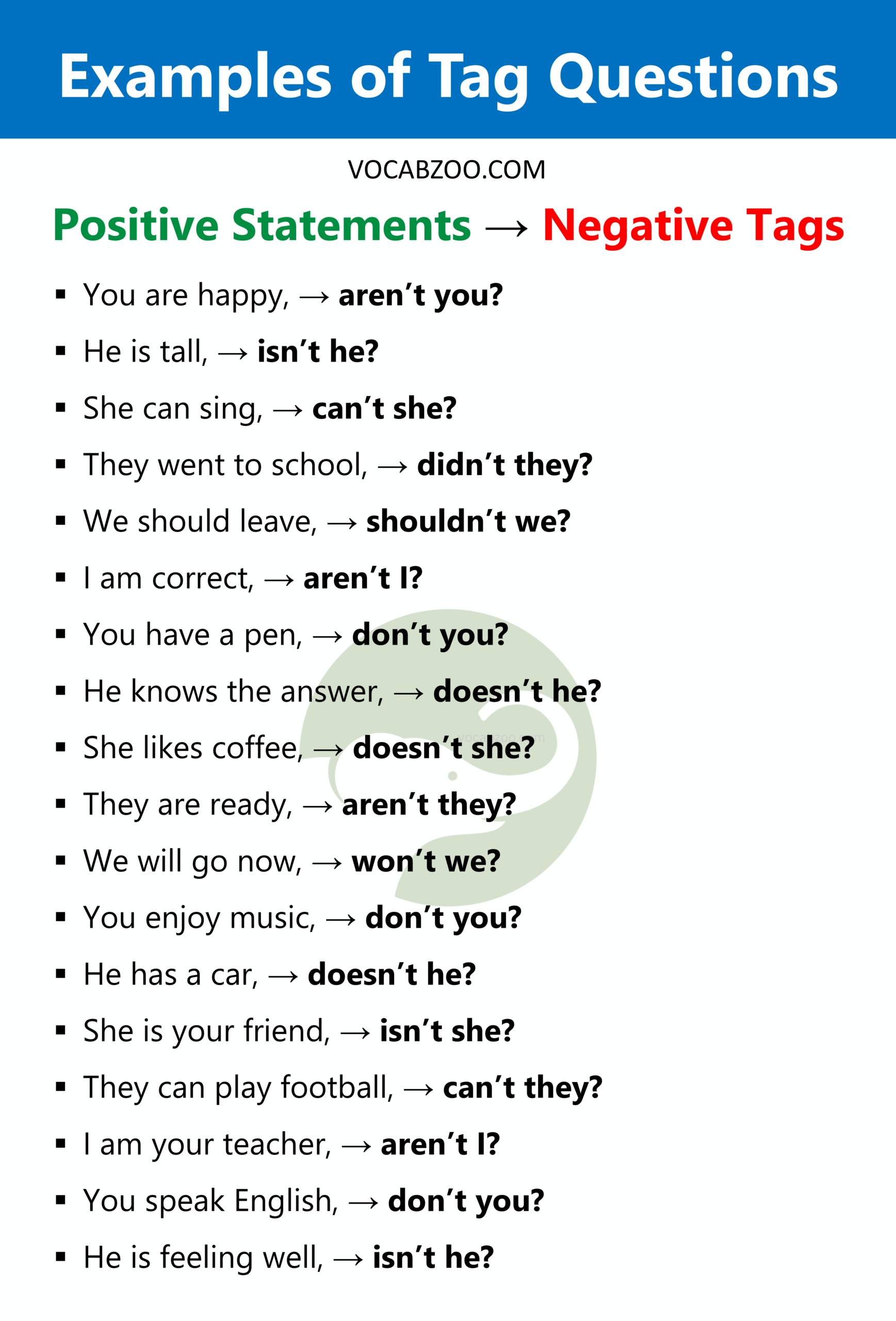
Negative Statements → Positive Tags
- You don’t like tea, → do you?
- He isn’t ready, → is he?
- She can’t drive, → can she?
- They haven’t arrived, → have they?
- We shouldn’t be late, → should we?
- I am not wrong, → am I?
- You haven’t met him, → have you?
- He doesn’t eat meat, → does he?
- She isn’t at home, → is she?
- They don’t know the answer, → do they?
- We can’t wait, → can we?
- I don’t have money, → do I?
- You aren’t busy, → are you?
- He hasn’t called yet, → has he?
- She doesn’t like pizza, → does she?
- They aren’t teachers, → are they?
- We don’t need help, → do we?
- I can’t swim, → can I?
- You haven’t finished, → have you?
- He isn’t listening, → is he?
Everyday Conversation Examples
- You like music, → don’t you?
- She is very kind, → isn’t she?
- He works hard, → doesn’t he?
- They live nearby, → don’t they?
- We can start now, → can’t we?
- I am invited, → aren’t I?
- You enjoy reading, → don’t you?
- He has a dog, → doesn’t he?
- She is tired, → isn’t she?
- They went out, → didn’t they?
Work/School Context
- We have English today, → don’t we?
- The teacher is kind, → isn’t she?
- You finished your homework, → didn’t you?
- He understands the lesson, → doesn’t he?
- They will join the class, → won’t they?
- I am correct, → aren’t I?
- You can answer this, → can’t you?
- She hasn’t started yet, → has she?
- We shouldn’t make noise, → should we?
- He isn’t late, → is he?
Travel and Directions
- You are going to London, → aren’t you?
- She hasn’t visited Paris, → has she?
- They can find the station, → can’t they?
- We will take a taxi, → won’t we?
- He doesn’t know the way, → does he?
- You have a map, → don’t you?
- She isn’t coming with us, → is she?
- They will enjoy the trip, → won’t they?
- I am on the right bus, → aren’t I?
- We can reach there soon, → can’t we?
Polite Requests/Offers
- Pass me the salt, → will you?
- Close the door, → won’t you?
- Help me with this, → can’t you?
- Call me later, → will you?
- Don’t be late, → will you?
- Take a seat, → won’t you?
- Give me a hand, → will you?
- Don’t forget this, → will you?
- Help him, → won’t you?
- Let’s start now, → shall we?
Mixed and Fun Examples
- I am late, → aren’t I?
- You will come, → won’t you?
- She has finished her homework, → hasn’t she?
- They were tired, → weren’t they?
- He doesn’t know the answer, → does he?
- You can speak slowly, → can’t you?
- She isn’t angry, → is she?
- We should eat now, → shouldn’t we?
- He has a new phone, → doesn’t he?
- You are feeling better, → aren’t you?
Situational Examples
- It is raining, → isn’t it?
- The sun is bright, → isn’t it?
- This movie is good, → isn’t it?
- You love chocolate, → don’t you?
- He isn’t at school, → is he?
- They are friends, → aren’t they?
- I am invited too, → aren’t I?
- You like this song, → don’t you?
- She hasn’t left yet, → has she?
- We are ready, → aren’t we?
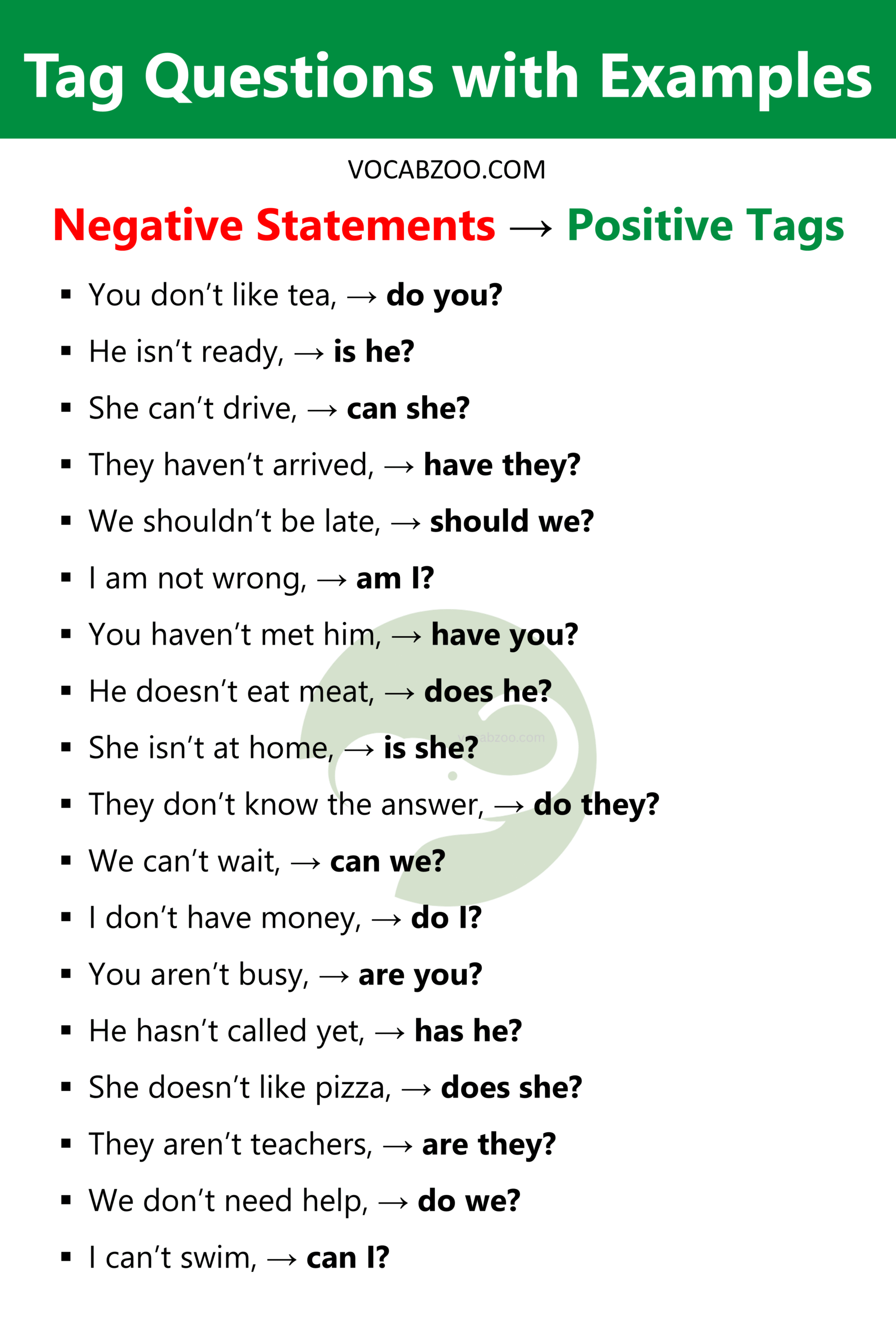
Tag Questions in Different Contexts
1. Everyday Conversation:
- You like music, → don’t you?
- She isn’t coming, → is she?
2. School/Classroom:
- We have English today, → don’t we?
- The teacher is kind, → isn’t she?
3. Work/Office:
- You finished the report, → didn’t you?
- The meeting starts at 10, → doesn’t it?
Tips for Easy Learning:
- Practice 5–10 questions daily.
- Use them in daily conversation.
- Remember positive → negative and negative → positive rules.
- Keep answers short and polite.
Tag questions make English friendly and interactive. By practising these 100 examples, you can quickly improve your conversation skills. Remember to use the right structure: positive statements with negative tags and negative statements with positive tags. Practice daily, and soon using tag questions will feel easy and natural.
FAQs about Tag Questions
What is a tag question in English?
A tag question is a small question added at the end of a sentence to confirm information or ask politely.
Example: You are coming, aren’t you?
How do you form a tag question?
Positive sentence → negative tag
Negative sentence → positive tag
Example: She is happy, → isn’t she? / He isn’t late, → is he?
Why do we use tag questions?
Tag questions are used to:
Confirm facts → You live here, don’t you?
Check agreement → It’s cold today, isn’t it?
Be polite → Pass the salt, will you?
What are common tag question words?
Some common words used in tags are: isn’t, aren’t, doesn’t, don’t, can’t, will, shall.
Example: They can come, → can’t they?
Can tag questions be used in any tense?
Yes! Tag questions can be used in present, past, and future tenses.
Example:
Present: She likes coffee, → doesn’t she?
Past: They went to school, → didn’t they?
Future: You will help me, → won’t you?
Read More
